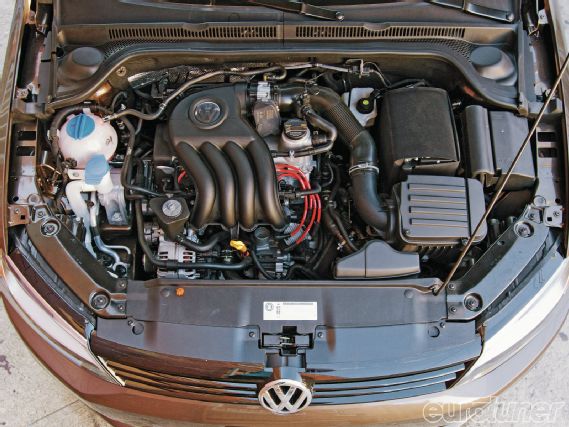 | 2012 VW Jetta 2.0 - Project Jetta 2.D’OH
| 2012 VW Jetta 2.0 - Project Jetta 2.D’OH
Yes it’s affordable, will probably last a long time, has good gas mileage and, if you let somebody borrow it, they probably won’t do anything dumb. However, to say it’s “slow” is an understatement. And that’s the biggest problem with the 2.0L four-cylinder in our 2012 VW Jetta 2.0 project car.
So we’ve been trying to figure out the best way to improve the looks and performance of our Mk6 Jetta. To date, we’ve added the Volkswagen Accessories body kit, 18" VW Motorsport wheels, OE RNS-315 navigation and H&R lowering springs. But what performance upgrades are available to make our Toffee brown slug faster than its 9sec 0-60 time?
Engine
This 2.0L 8v will be remembered from the Mk3 and Mk4 models. And while it was deemed inappropriate for the Mk5, it’s now an option for the Mk6…
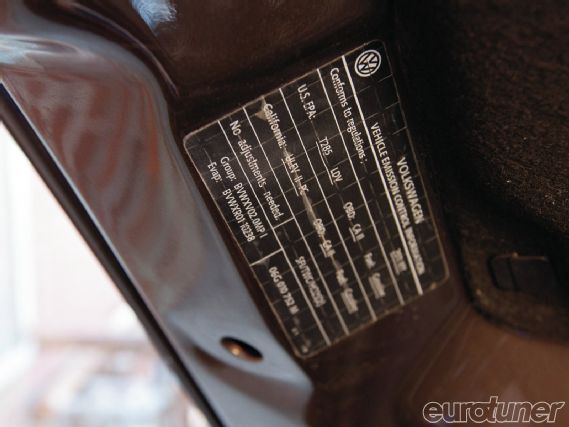 |
ULEV could be the ticket for easier tuning
|
ULEV could be the ticket for easier tuning
The Mk6 version has the same 82.5mm bore and 92.8mm stroke of the older Mk4 engine, giving it a displacement of 1984cc. In its newest form, the naturally aspirated 2.0L engine only puts down 115hp and 125 lb-ft (compared to 115hp and 122 lb-ft for the Mk4).
“The Crossflow head on the Mk6 was designed to optimize emissions and is about the only difference over the earlier models,” Adam Ligon from Black Forest Industries informed us.
Superchargers
With its similarities to the older 2.0L engines, Neuspeed is able to offer several options to Jetta owners. And while we were admiring the various new plastic parts VW had added, Aaron Neumann disappeared in search of a few things that might work.
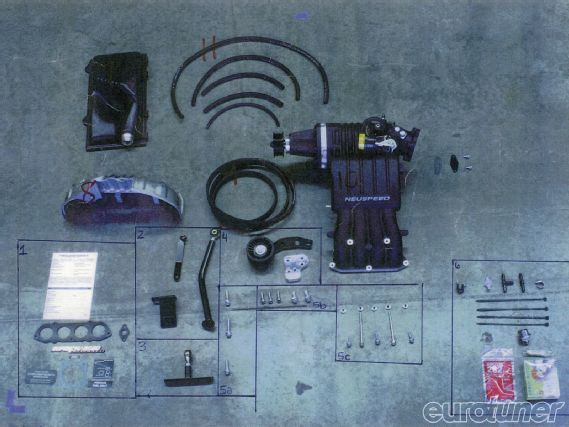 |
Neuspeed’s Mk4 2.0L supercharger kit comes with the manifold, belt, idler pulley, P-Chip tuning, gains 50hp and can be installed in about 3 hours. It looks like the best option for the Mk6 2.0…
|
Neuspeed’s Mk4 2.0L supercharger kit comes with the manifold, belt, idler pulley, P-Chip tuning, gains 50hp and can be installed in about 3 hours. It looks like the best option for the Mk6 2.0…
He returned with a beautifully machined supercharger they offer as a performance upgrade for the Mk3 and Mk4 2.0 models. “We developed the blower for reliability and dependability,” Aaron stated. “You just fit it and drive it. It’ll give 50hp with decent response and is CARB-exempt for ’99-2000 throttle-by-cable vehicles!” The kit has never been fitted to a Mk6 Jetta 2.0L before but, surprisingly, it wouldn’t appear to need many modifications to make it work…
As a kit, the supercharger comes with an intake manifold, mounting brackets, head shield, belt, tensioner-pulley and hardware. Adding it to our Mk6 would only seem to require a Mk4 2.0L lower aluminum manifold to bolt the blower to the head.
In addition, a Mk4 2.0L fuel rail with either OE or aftermarket 200cc injectors would be up to the task. Getting the injectors wired to the new harness would need adapters, which Neuspeed offers for a clean install. And once everything is buttoned up, 91-octane will now be the button of choice at the pump.
For the tune, Aaron informed us the MDB 17.5.6 ECU is a new unit very few people have worked on. However, the engine is set-up with a ULEV parameter system, giving it flexible parameters for engine and software tuning. So if somebody was to install the kit, Neuspeed would need to first send the ECU to Germany for coding.
The Neuspeed supercharger kit costs $2500 plus $500 for the P-Chip tuning, and you’ll need the additional hardware mentioned. And while the price is high, Neuspeed appears to be one of few companies theoretically able to offer attractive horsepower gains over stock on the Mk6 Jetta 2.0-liter engine.
DIY Turbo Kit
After hearing about a possible turbo kit for the Jetta’s 2.0L 8v, we scurried over to Godspeed Projects. The company is better known by the JDM crowd for offering everything from turbo kits to intercoolers, piston, rods and radiators, etc. However, its Euro inventory is growing, with bigger turbos and intercoolers becoming available.
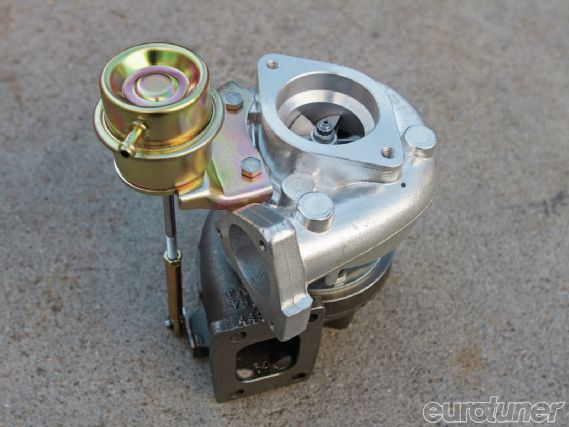 |
2012 VW Jetta 2.0 - Project Jetta 2.D’OH
|
2012 VW Jetta 2.0 - Project Jetta 2.D’OH
Its existing 2.0L turbo kit was designed for the Mk3 and Mk4 2.0 using a T2871 with 50-trim turbo, exhaust manifold, wastegate, oil lines, side-mount intercooler, BOV, piping, silicone couplers and hardware. For the Mk6 application, it would be expected to need injectors, custom intercooler brackets and piping as well as a custom exhaust.
Danny Chung from Godspeed suggested that running the T2871 at 5-7psi should give an estimated gain of around 50hp. Being among the first to inquire about installing this existing kit on a Mk6 Jetta, we would need to find a company able to tune the software before we could embark on the project, but the Godspeed hardware would cost around $900.
It’s worth noting that Aaron Neumann advised us that because a turbo absorbs engine heat, fitting this sort of kit might prevent the cats from heating properly. This could have an adverse affect on emissions, but since it would fail a visual inspection anyway, we assume such a conversion is for the hardcore Mk6 Jetta 2.0 owner!
Custom ECU Tuning
We assumed that custom software for a DIY turbo system would be relatively simple to obtain. So we called Unitronic Chipped for advice since its custom programs for big-turbo upgrades made them a likely candidate.
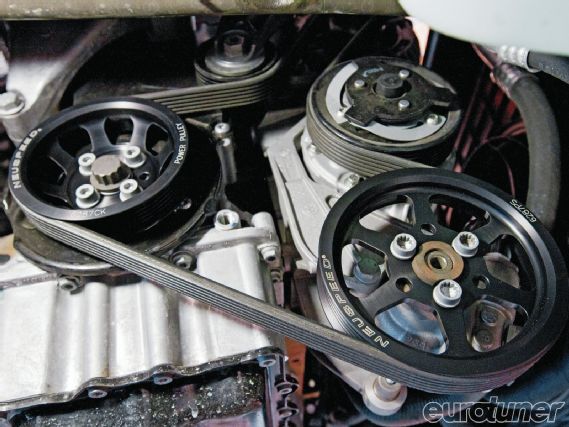 | 2012 VW Jetta 2.0 - Project Jetta 2.D’OH
| 2012 VW Jetta 2.0 - Project Jetta 2.D’OH
Unfortunately, Unitronic didn’t want to guarantee it could deliver for the 2.0L, citing the engine’s lack of performance options as the reason. We also spoke to Revo Technik, who explained that there’s currently insufficient demand for software, meaning they’re focusing on the GLI/GTI and TDI models at present.
After some research we phoned United Motorsports: “A 2.0L 8v in a 3000 lb car isn’t going to be quick at all,” Jeff Atwood laughed. But since we were the first to ask if custom software was even possible for the Mk6, he suggested an upgrade to 440 lb injectors and a larger mass air sensor would give more latitude for tuning. As for fuel delivery, Jeff was confident the stock fuel pump would cope with the demand. So he claimed it was possible but that the results, how much would it cost, and how long it would take, would need to be calculated.
Neuspeed Pulleys
If you’re looking for something that won’t break the bank and might improve throttle response, Neuspeed’s Mk4 Power Pulley kit could be the ticket. We were all surprised to discover the replacement crankshaft, power steering and alternator pulleys would fit the new car.
The Mk6 has an updated clutch-type alternator pulley that helps reduce rotation in the wrong direction, however. Deciding it would be best to keep this in place, Aaron Neumann offered to swap our crankshaft and power steering pulleys.
The biggest difference was seen in the crank pulley, where the OE item weighed 3 lb 13.4oz, while Neuspeed’s replacement tipped the scales at just 8.7oz.
The lower weight, combined with a 20% reduction in size, is claimed to add 5-7hp to the Mk4 2.0. The upgrade also improves throttle response by allowing the revs to climb faster.
To help you, we have a complete step-by-step installation guide for the pulleys on the Tech pages at eurotuner.com
Although we didn’t dyno the parts, they certainly offer a “seat off the pants” improvement when we test-drove the new set-up. From 3000rpm, the Jetta pulled sharper than before in first and second gear. Additionally, we noticed the climb from 60-80mph seemed more spritely. Overall, the $239.95 upgrade was easy to install and injected some pep into the sedan.
Neuspeed Wires
The old school 8v motor still uses ignition coil wires rather than coil packs. So Neuspeed was pleased to discover they could upgrade the OE wires with its high-quality 8mm silicone leads that have a solid copper core.
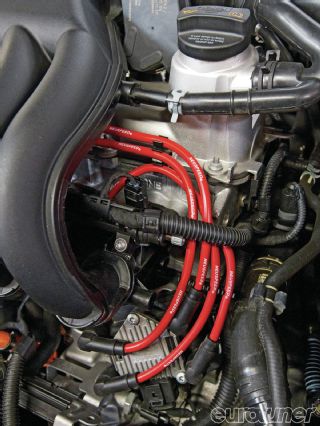 |
2012 VW Jetta 2.0 - Project Jetta 2.D’OH
|
2012 VW Jetta 2.0 - Project Jetta 2.D’OH
Fitting is a walk in the park since they’re literally plug-n-play. In fact, they built a set for us by hand using OE-approved spark plug connectors while we waited. The wires cost $49.95 and come in a sporty red color that dress-up the engine bay nicely. The more accurate spark delivery should help maintain engine performance over the long run.
C2 Flash
Another N/A option is the C2 Motorsport N/A Performance Flash. This software is claimed to provide 10-12hp gains with better throttle response and mid-range for $249.99. The flash should help MPG and can use 87-, 91- or 93-octane gas.
Final Decision
If your debating whether to buy a Mk6 Jetta 2.0L, 2.5L, GLI or TDI as a project car, we’d suggest you start with the most tunable engine. And, unfortunately, that means the Jetta GLI, TDI or 2.5 have many more options than the 2.slow, making them a better long-term prospect.
The GLI’s 2.0TSI engine is capable of more than 300hp with big-turbo upgrades. There are also plenty of software options, it comes with both independent rear suspension and four-wheel disc brakes – both of which were deleted from the 2.0 8v version.
The TDI responds well to software, as we discovered with our Mk5 project car. Using Revo software it gave a substantial spike in mid-range torque.
The 2.5L five-cylinder would be our third choice, both because its a better platform that the 2.0 and has more power out of the box. We’re also seeing more tuning options everyday, starting with turbo upgrades, a short-runner intake, software, exhaust, intake, etc. In reality, the gains will be more expensive and deliver less than the 2.0TSI, but the 2.5L is a good place to start if your budget permits.
In reality, the main attraction of the Jetta 2.0 is its $16645 price tag. This makes it a cheap entry ticket to the Volkswagen community but inevitably, tuning options will always be limited in comparison to the other Jetta models. And the few parts that become available, won’t deliver as much improvement as on the other engines in the range.
The smartest option would be to buy a car with better tuning options to begin with. But if low-n-slow is your calling, check out the next installment of Project 2.d’oh when we hope to drop it on the floor with air suspension.
